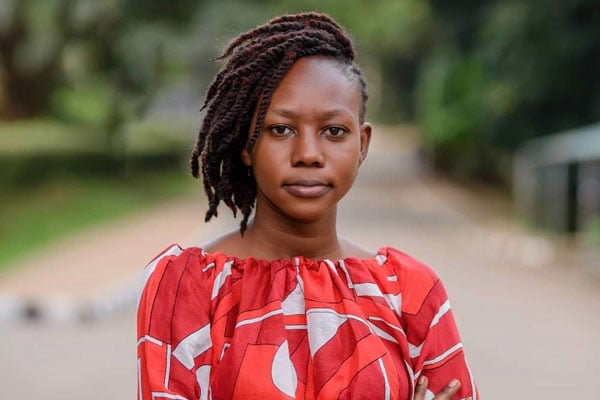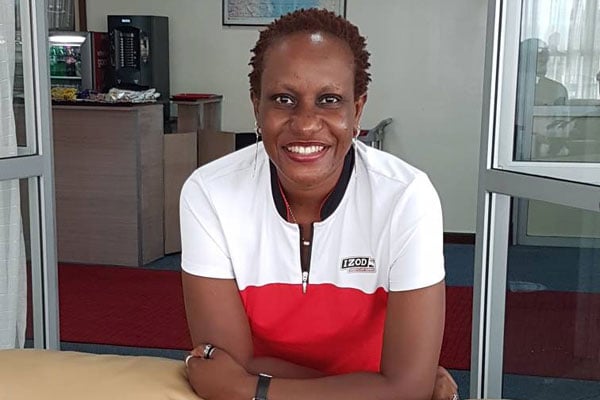Prime
Grief and loss: When a child dies

What you need to know:
- Grieving. No one has ever been prepared for the death of a loved one. Worse, that of a child. When a child dies, the void left behind by their absence is indescribable that can never fully be understood unless experienced firsthand, writes Lydia Felly Akullu.
Disturbed by their three-year-old’s loss of appetite, Fortunate Ingabire and Martin Mugarura took their child for a diagnosis at a children’s hospital, where they found a bacterial infection and were later given medication.
Here, the couple found themselves worried that their daughter might get dehydrated, prompting them to put the baby on a glucose dose.
“What I vividly remember is that the nurse, after putting the water in, inserted a dose of epinephrine. I can’t forget the name of the drug because I literally saw her getting it and injecting it, and as soon as she did that, the girl started vomiting. Then the next time she threw up, I saw a bit of blood, and they were a bit slow. So when I said, ‘Guys, I am seeing some blood,’ that’s when the doctor rushed, moved her to the bed, and tried to nebulize her,” Ingabire recounts.
Ingabire says the doctor at some point asked them to get an ambulance, but just as they waited, news came that the child had died.
“The doctor turned and told us, ‘I am sorry, I can’t find the pulse.”
“Of course, I didn’t understand what that meant. I asked him what he meant. “What do we do to find the pulse?” He said, “No, what we mean is that she is gone”,” Ingabire recollects.
A doctor, whose name she can’t recall, told her the baby could have gone into septic shock. But a couple of days later, another doctor said it could have been hypoglycemia.
According to the medical report, the child’s death was caused by aspiration resulting from pneumonia.
Ingabire lost her baby on March 25, 2020, during a Covid-19 lockdown when movements were restricted, making everything that much harder.
Sudden death
Like Ingabire, Denise Kekimuri also experienced the loss of a child very unexpectedly.
Kekimuri and her first child were opening Christmas gifts when her waters broke.
She immediately called her doctor, who then asked that she visit a hospital for a scan. But all hospital staff had gone for a Christmas break except the receptionist, who advised her to try elsewhere.
Kekimuri, who would later discover she was going into premature labour, was put on medication that eventually took her to surgery on December 28, 2017.
“They took her out, screaming her lungs out,” she recalls. This worried Kekimuri, but when the child finally calmed down, she asked to hold her. Little did she know that would be the last time she held her baby.
At around 4 pm on the same day, Kekimuri felt a slight pain in her breasts, which she thought was a sign that her baby was hungry. It was at this point, she says, that one of the nurses called her cousin, who had gone to check on them at the hospital.
But her cousin’s delay raised concerns. An hour later, her cousin walked in with a doctor who asked visitors to move out of the room.
After a few checks, unfortunately, she was told the baby didn’t make it.
According to the death certificate, the baby succumbed to respiratory dysfunction (RDS).
The pain of loss
The death of a child comes with immense grief and a range of emotions like sadness, worry, and anger—something that these parents went through when they lost their little ones.
Kekimuri recalls the shock and denial she had moved into while pregnant but had to come back empty-handed.
She at times thinks her baby was switched with another. Before this loss, she had encountered a miscarriage at nine weeks. Pain from her loss through the miscarriage also started haunting her.
She now grieves two losses. Each time she saw a pregnant woman, or whenever those who did not know about the baby’s death congratulated her, she broke down.
For Ingabire, the pain, grief, and loss made her go through a lot of sleepless nights.

Painting of Fortunate Ingabire, Martin Mugarula and the late baby. Photo | Pool
Coping mechanisms
Ingabire says one cannot move on from the loss of a child, like many say. She believes that one can only learn how to move through life with the knowledge and understanding that the child has died and that there are lessons to draw from it.
She also believes a special spiritual connection between her and her lost child lingers because “she was me before she was herself.”
Another way she copes is by buying gifts for different children on her late daughter’s birthday. She has written a book, Hope After Loss, in memory of her daughter.
Grieving as a couple
Since individuals grieve differently, the death of a child deeply affects a couple’s relationship.
Women frequently feel neglected by their spouses and mistakenly believe that men do not grieve in their quest for healing.
Ingabire and her husband, Mugarura, admitted that the death of their daughter affected how each other felt. She was convinced that her husband was not grieving with her.
She is introverted, and her husband is very outgoing. This, she said, created a certain kind of loneliness for her since her husband, the only person she had then, was not there for her.
“There was a strain because we were still healing individually. And yet, sometimes as women, we want to do things with our spouses,” she explained, adding, “So my thinking was probably that we are grieving together, so let’s heal together. But you realise that even he is dealing with something. He also needs his own personal support, but I think in that moment I didn’t understand.”
For Mugarura, however, the loss helped him understand his spouse much better.
“At that time, I think our relationship became better because it gave us time to reflect on ourselves, to get to know who I really am, what I like to do, how I would love to be supported, and things like that.”
This, in turn, helped him understand his wife better, and the two now have a stronger relationship.
Kekimuri wishes someone had been there to tell them what to do and expresses worry about her husband because he did not have a support system like she did.
Activities that help
Just like Ingabire, Kekimuri found peace by writing a book titled So What Next, describing her grief. She journals a lot and attributes this to her family upbringing.
“My mother used to say, if you can’t find it, write it,” she said.
For her, “When you are dealing with loss, there are more questions than answers. For some people, their answers trickle in, but for others, they come in a rush. For others, they never get to reconcile with the loss.”
Kekimuri also started an organisation called Vessel Is Me, which offers care for families who have experienced pregnancy loss, neonatal deaths, and couples dealing with infertility.
Even at the hospital, Kekimuri says, the doctors and nurses who felt some kind of sympathy for her were those who had gone through such a loss.
Accepting the loss
One lady, who preferred to keep her identity anonymous, admitted being greatly disturbed during the early stages of grief.
She lost her baby to cot death.
Months before that, she had given birth well, and the baby was fine. But after completing her maternity leave, she resumed work, leaving her child under the care of a housekeeper.
But while at work on Saturday that week, she received a call that her husband had fallen ill and was rushed to the hospital in critical condition.
She had to make her way to the hospital. A couple of hours later, she received a call from one of her neighbours. The caller kept mum a little because she heard neighbours accuse the househelp of killing their child, but spoke anyway.
Her grief was palpable in the early months after she lost her sleep. Sometimes, she says, she would hear her baby cry at night.
She, however, started to find peace when the sheikh who officiated her son’s burial preached about life after death. The sheikh said babies who die at an early age secure a place for their parents in paradise.
This, she says, does not mean parents should misbehave while on earth but live a holy life to be accepted into paradise.
The loss of a child will hit any parent hard, whether they choose to express it or not.
For most, life might not be the same again, but when they find healthy ways to cope, they are able to heal and cherish the memories they had with the children who have passed on.
How men and women grieve differently
Simon Ndaula, a clinical psychologist with Vessel is Me, says men and women grieve differently, and this is why understanding each other is paramount.
He articulates that women are more vocal and emotional, which requires a support system to hold them together.
“For men, socialising is tough because they don’t have that language of supporting each other like women,” he elaborates.
However, the fact that men are not expressive about their grief does not mean they are not grieving.
Ndaula adds that women can be spared from thinking their husbands are not grieving because men are not engaging and expressive when it comes to painful situations, especially in front of women.
This is because men fear being vulnerable before women. However, women might term this as avoidance.
Denise Kekimuri argues that men’s grief is what society does not pay attention to.
According to her, men are told to be strong for their partners, which ignores the fact that both parties are grieving.
Ndaula also states that men love their space when pain hits because it helps them think.
“Men like staying alone and processing things. We will move away from that space, go to the bar, link up with our boys, do something, tinker around with some machinery, or anything like that. That’s how we deal with things, so even when we have a problem, we join our fellow men. It helps us cope even though we are not talking about our pain; we talk about football and other things.”
According to him, women should appreciate that by default they will reach out to friends and family for help, but men may not find it easy to do so.
Even as children, society teaches men to never cry, whereas girls are soothed as they cry.
“Boys don’t cry, so we grow up with that tough mentality. So it’s not that we are actually aware. It’s just like following the rules.”
However, he admits that it is worrying when men don’t cope properly, as they might exhibit changes in physical behaviour. They can become verbally and physically aggressive, becoming a bit disorganised for a person who was neat, and some may begin smoking or drinking more.
He encourages couples to seek medical help as they deal with a loss because it will enable them to understand each other.
QUICK NOTES
Cot death is the sudden and unexpected death of a baby who seems healthy during sleep. It is also called sudden infant death syndrome (SIDS).
It can happen anywhere a baby is sleeping. This includes a cot, pram, bed, car seat or baby seat.
Cot death is one of the main causes of death in babies from four weeks to 12 months of age. It is most common between two and four months of age. It can also happen to older babies.





